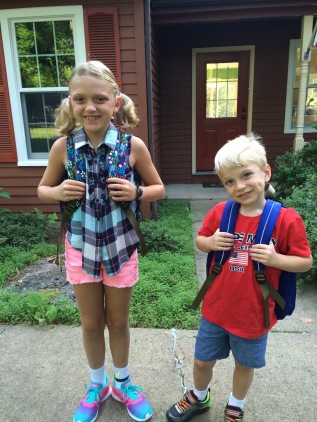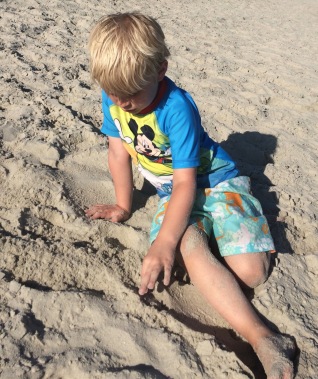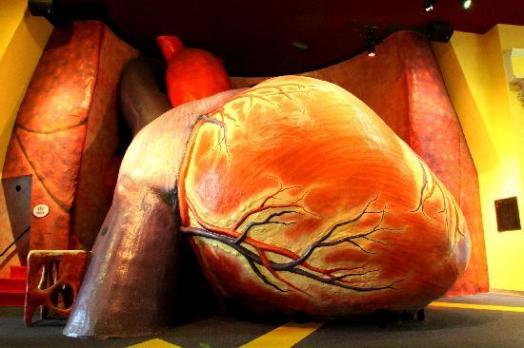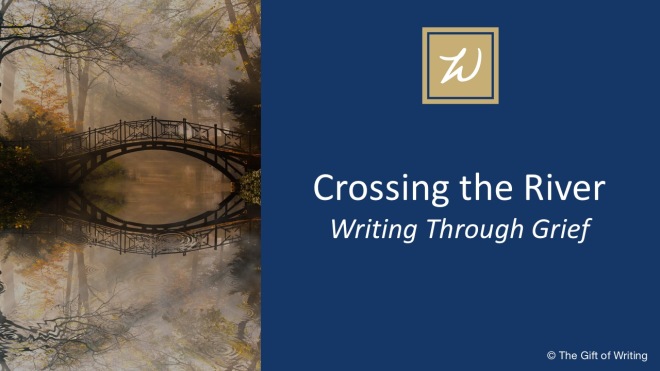Summer is over. Not technically of course, but once school begins something in the air shifts even before the temperature drops.
We’re still adjusting here. My daughter to her new school, my son to his fuller schedule, and me, to longer stretches of time alone.

First day of 3rd grade and pre-K
The first day of school, I sat at my desk and felt the emptiness of the house echo in my bones. My son was having his first full day, which meant, so was I. This was what I wanted, and yet I felt a pang of melancholy, and received a flash into the future when my children grow up and leave home.
Is it me, or does time seem to go faster the older we get? During our second annual vacation to Cape May in August, I tried to hold onto the hours and days, but it felt as futile as watching my son clutch a fistful of sand. The tighter the grip, the faster the flow.

Now that we’re into the second week of school, I feel the beginning of a rhythm, though shaky. My natural impulse is to rush headlong into fall and not look back. I’m done with summer, I told my husband as we debated about going to the pool last week.
He looked surprised. I’m not, he said, and I suddenly realized I’m not either. My sadness about summer’s end is what makes me harden and give it the cold shoulder.
This is how I deal with change, with transition. When it’s uncomfortable – and it always is – my natural inclination is to hurry through it. I liken it to the Band-Aid metaphor: rip it off or peel back slowly.
I want to rip it off. I want to toss it in the trash and not look back. But my heart gently reminds me to care for my wounds, no matter how small they are, and what I really need to do in moments like these is feel. Even when it hurts. Especially when it hurts.
My mother’s death was the first time I truly understood the futility of hurrying through a transition. Grief is like a boulder. It’s not easily moved aside. You can fight and struggle against it, you can close your eyes, but it’s still there. Waiting for you.

It’s similar when a person is struggling with their health or has a disease. There is no ignoring sickness. You feel it in your body. You’re reminded of it every day when you wake, every night when you go to sleep, and many hours in between.
Recently, I went for my annual physical and my doctor was concerned about the sound of my heart. She heard a murmur, the whooshing sound of blood going back and forth through one of the valves instead of just forward. To be on the safe side, she sent me for an echocardiogram.
Mostly, I was calm, but I felt a tiny sliver of fear. This is the heart we’re talking about, my heart. The life force of an organ that kept my mother alive even when everything else in her body was ready to quit. What if there is something wrong with my heart?
The (sort of) joke in my marriage is that I’m the healthy one. I don’t have allergies or celiac, I’m apparently immune to poison ivy, and I haven’t had the flu since childhood. I’m rarely sick. I think it surprised us both that something might be wrong with me.
My husband offered to take me to the appointment. I didn’t realize until we arrived at the hospital how grateful I was to have his company. He had already been to this hospital three times for his own tests, but this was my first.
The technician was kind and professional. She dimmed the lights and turned on music. Soft familiar strains of Enya floated through the invisible speakers. The gel was warm as she moved the instrument across my chest.
My head was turned away from the screen, but every now and then I caught a glimpse of the shadowy interior of my heart. I could hear it, too, the whooshing, and I was struck with how precarious life is, how fragile our bodies can be, and how miraculous.

The Giant Heart at The Franklin Institute in Philadelphia
In the days before getting the test results I mostly put it out of my mind, but the what if’s whispered on occasion. I thought about the research I did years ago for my MFA thesis, titled, The Night Side of Life: Illness in Fiction, which was inspired from a quote in Susan Sontag’s book Illness as Metaphor.
“Illness is the night side of life, a more onerous citizenship. Everyone who is born holds dual citizenship, in the kingdom of the well and in the kingdom of the sick. Although we all prefer to use the good passport, sooner or later each of us is obliged, at least for a spell, to identify ourselves as citizens of that other place.”
We toe the line between well and sick every single day we are alive. At any moment, we can be pushed or thrown to the other side. My mother found this out when she was diagnosed with multiple sclerosis at age 40. One day her life was moving along as expected, and then, suddenly, it wasn’t.
My test results came back normal. Relief. Gratitude. I’m off the center line, back on the safe side, for now.
I can’t help thinking about how my doctor described the murmur in my heart. The blood not moving in a straight line, but whooshing back and forth. That is how I live my life. Dipping back before going forward, and back again. It’s painful at times, yes, but I wouldn’t have it any other way.
***
I wonder how the transition into this new season has been for you. Do you also struggle to remain present inside discomfort? I’d love to hear from you in comments! I’ve missed you this summer, and now that school is back in session, I’ll be returning to my (mostly) regularly scheduled programming.
Also, as some of you know, I’ve spent many months preparing for my online journaling course, Crossing the River: Writing Through Grief, which is now scheduled to begin January 2017.
If you’d like to be put on the mailing list for updates about the course, and the upcoming free (!) online seminar, click here.

[Please note, this course is NOT intended only for those suffering a loss from death, but ANY kind of grief. The scope or size does not matter, nor does how much time has passed.]
